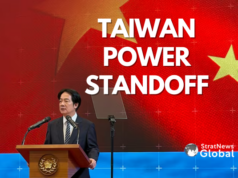Georgia MPs fought on the floor of parliament as tempers rose over a contentious “foreign agents” bill that would require organisations receiving foreign funding to register as foreign agents or face penalties. As the MP brawled inside, hundreds of demonstrators gathered outside parliament, determined to register their opposition to the bill with a huge turnout.
This legislative push by the ruling Georgian Dream party comes 13 months after similar plans were abandoned due to widespread protests. The reintroduction of this bill has attracted criticism from the United States and European countries. The European Union, which granted Georgia candidate status last December, has voiced concerns that the bill contradicts the fundamental values of the bloc.
Critics within Georgia have derisively nicknamed the proposed law “the Russian law,” drawing parallels to similar legislation in Russia that has been used to suppress dissent. This comparison is particularly resonant in Georgia, where there is strong animosity towards Russia following Moscow’s support for the separatist regions of Abkhazia and South Ossetia and the brief war between Russia and Georgia in 2008.
The ruling party contends that the legislation is crucial for countering what it describes as “pseudo-liberal values” imposed from abroad and enhancing transparency. However, this stance has been met with vehement opposition from civil society organisations and opposition parties, which have rallied for a mass protest outside the parliament building.
With the legal affairs committee, controlled by Georgian Dream and its allies, set to approve the bill, it will soon advance to the first reading in parliament, signalling a significant escalation in the legislative process and potentially further protests. Georgian Dream says it wants the country to join Nato and Europe, even as it has deepened ties with Russia and faced charges of authoritarianism at home. Georgia’s Prime Minister Irakli Kobakhidze had met the ambassadors of the US, UK and the EU on Monday to discuss their opposition to the bill. He said it was not clear why they were opposed to it.
(With inputs from Reuters)





